Welcome to my blog. Follow me on Twitter, Instagram, Deviantart, Wattpad, AO3, and Quotev for my (upcoming) stories, story updates, and other fun endeavors!
Don't wanna be here? Send us removal request.
Text
"Jedi must ignore their feelings." "That's quite a statement. Is it your own?" "Yes." Then the boy considered. "Well... Qui-Gon and Obi-Wan said much the same." "I think you misunderstood," Mace said. "Jedi do not ignore their feelings. They integrate them. Own them. They fear, but they are not afraid of fear. They grow angry, but they allow their anger to motivate only honorable action. Do you understand?" The boy nodded, but Mace knew he did not --yet. There was time. -Mace Windu: The Glass Abyss by Steven Barnes, pg 24
827 notes
·
View notes
Text
Whenever I think about the dark side and how Star Wars talks about it, it's never as small as having a temper or being prideful
It's those character flaws to an extreme
It's the loss of control. The loss of stability. The loss of who you really wanted to be. It's everything you would be if you sacrificed any kind of restraint
No one's turn to the dark side has ever been treated as a freeing experience because that's not what it is. Most dark side users have been broken down and twisted by even worse characters into following them. In most cases, it takes years of pain and suffering to be fully corrupted. It takes direct brainwashing to turn someone quickly. The very few who seemingly turned to the dark side completely by their own choice were just inherently drawn to the worst aspects of a person's nature
Many jedi have their own flaws and struggles. Quite a few lose their way and need time to rediscover themselves and who they are as jedi, but many of them never fall to the dark side because the dark side is more severe than having negative traits
The light side represents who a person is when they are at peace with themselves. It's who they are when they accept their vices as part of them, and then refuse to let those same vices dominate them. Keeping your worst traits under control is not a form of repression
The dark side is the full rejection of all of your positive traits. It's embracing your vices to the point that compassion and kindness no longer exist. It's expressing every negative emotion without thought or restraint
Light represents freedom. You're free to decide for yourself what kind of person you want to be. You're free to choose your way forward. You're free to change and grow as you please
Darkness is the one that represents being trapped. It's the side that chains you to your hatred and refuses to let go. It's what blinds you to the goodness in the world and lose sight of everything you hoped to be
That's why there's no such thing as positive corruption in Star Wars
2K notes
·
View notes
Text

"Can you believe they thought this would work?"
"And then that it did!?"
759 notes
·
View notes
Text
“Be gentle with yourself. You are a child of the universe, no less than the trees and the stars; you have a right to be here.”
— Max Ehrmann; Desiderata
6K notes
·
View notes
Text
"All these years Ben has been waiting for Luke to come of age so that he can become a Jedi and redeem his father."
"The part I am working on now is mostly about Darth Vader, who he is, where he came from, how he became Luke and Leia's father, what his relationship to Ben is. In Jedi the film is really about the redemption of this fallen angel. Ben is the fitting good angel, and Vader is the bad angel who started off good. All these years Ben has been waiting for Luke to come of age so that he can become a Jedi and redeem his father. That's what Ben has been doing, but you don't know this in the first film." - George Lucas in Star Wars: The Annotated Screenplays
“A Jedi can’t kill for the sake of killing. The mission isn’t for Luke to go out and kill his father and get rid of him. The issue is, if he confronts his father again, he may, in defending himself, have to kill him, because his father will try to kill him.” - George Lucas, 1981 story conference, from The Making of Return of the Jedi
"[Obi-Wan] knows that, eventually, Darth Vader is going to come looking for them. He knows this whole thing is going to blow up into a big war. He knows a confrontation is brewing between Luke and his father. Ben hopes Luke will either save his father or kill him, because whatever extra powers Luke’s got in his lineage, he is the one person that can probably fight his father and win." - George Lucas to Paul Duncan in Star Wars Archives
610 notes
·
View notes
Text
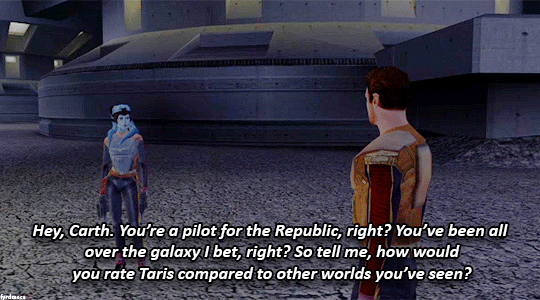

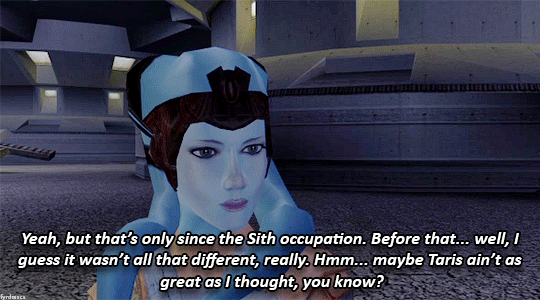
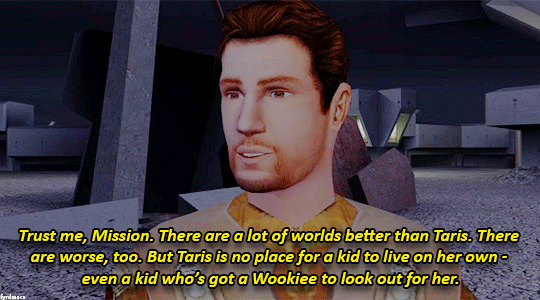

Carth: "Don't you snap at me, missy! You want a lecture? How's this: only bratty little children fly off the handle because of a simple comment.
209 notes
·
View notes
Text
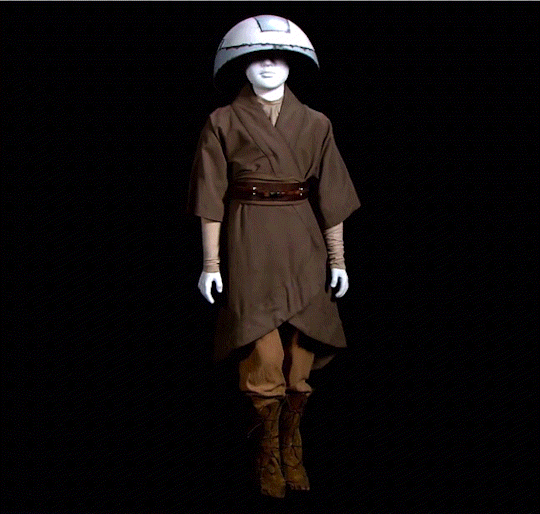
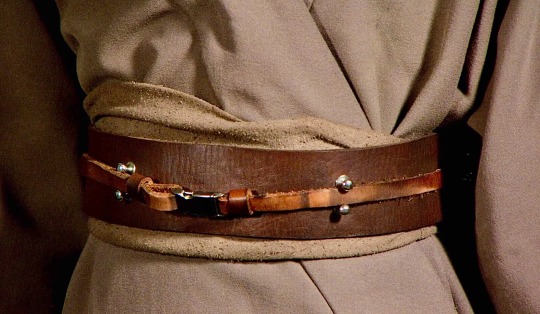
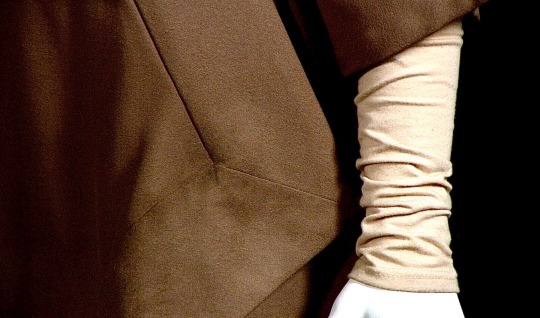


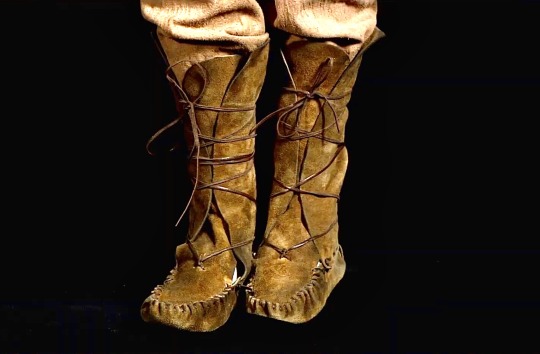
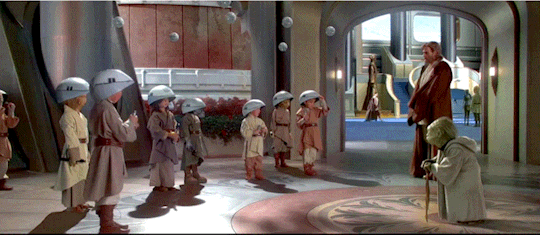
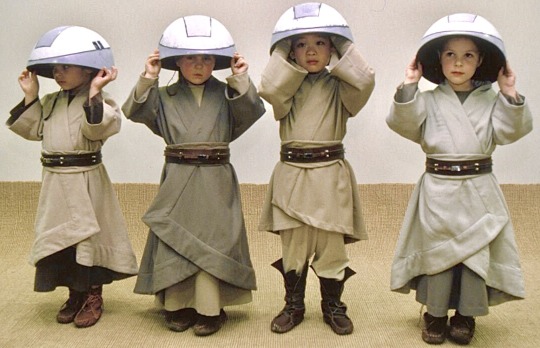
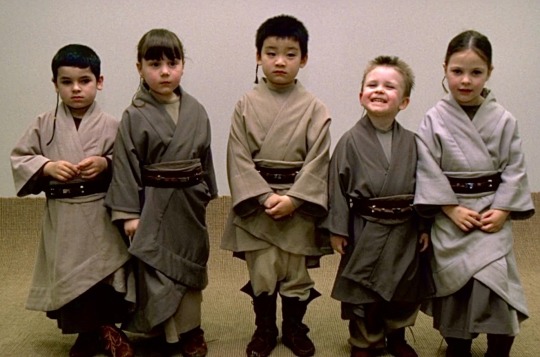
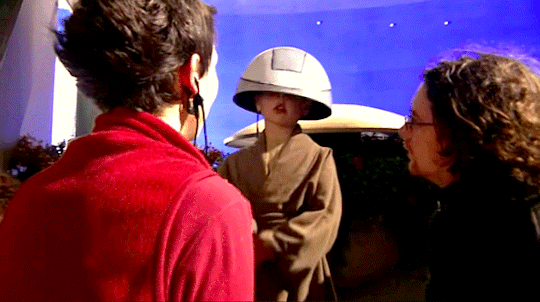
JEDI YOUNGLING ROBES
Jedi younglings had two outfit variations - long and short robes with trousers. All costume pieces were interchangeable between genders.
“I made sure that we didn't ever see two people who looked the same…because they're all individual people, from different places and different cultures and all with different builds and bodies. I think it’s much more visually interesting.” -Trisha Biggar, Prequels Costume Designer
3K notes
·
View notes
Text
How was Anakin Skywalker selfish and greedy?
When we love, we usually love in two ways
When we’re attached, that means we want to be with that person, and we don’t want to be without that person. Why is that? When we want to be with someone, that’s because they make us feel good. They’re beautiful, kind, smart, comforting, funny – we like them, we enjoy them, or more correctly, we enjoy these good qualities of another person, because they bring us happiness. In turn, we desire to be with them, so we can be supplied with the happiness, we can receive those pleasurable experiences. Is that, in our mind, a bad thing? No, it is not. But is that self-referential? Yes, it is – it’s entirely focused on ourselves, it’s the desire to make ourselves happy. And that is why attachment is called selfish.

Is that, in our mind, a bad thing? No, it is not. But is that love? No, it’s not love. Because love is unconditional, compassionate: we’re concerned about the well-being of another person, regardless how they make us feel. We want them to be happy, and we want them to be free from suffering. That is unconditional, compassionate love. It’s focused on another person. The core of love is being happy for another person’s happiness, to rejoice for, and rejoice with another person. It’s the desire to make another person to be happy.
So, love and attachment are two clearly distinguished relations to another person. And the main difference between attachment and love is, that attachment is a linkage to another person, formed out of the desire to experience the happiness ensued upon their company, upon having them in our lives, whereas love is unity with that person, birthed by feeling how they feel, their joy is being our joy, their sorrow is being our sorrow.
How attachment is bad?
Now, the question, “How attachment is bad?” is understandable. It’s generally considered to be selfish, but not self-indulgent, certainly not possessive, greedy or bad. The answer is that attachment, which is our striving to not to be parted from the source of our happiness, is in stark conflict with how reality is. The most fundamental truth that on some level we all know about the universe, and everything in it – all things and beings - is that everything is transient. Everything is constantly changing, moving from beginning to end, from creation to destruction, from birth to death, from meeting to parting. People and things will be there in our lives, then they won’t be there, because they’re passing through our lives, and life itself is passing through us. For this, attachment is grasping, grabbing onto the coming and passing things in our lives, wanting to have, to possess, to own, to keep them, so we can stay happy, whereas that’s impossible. We can’t hold onto things, we can’t make them stay, we can’t have them, they’re not ours. They have their own course, moving to us, then moving away from us.


And that is why attachment is greed: it’s self-interested desire for more of the happiness, that it was given, that it was possible to have, desiring things to not to move away. And that is why when we become attached to a person or a thing, we become afraid of losing them – we’re afraid to be without them, we’re afraid from the pain of not having the happiness they give to us. The greater the happiness, the more we afraid, the more we want to hold onto it, and when we ultimately, inevitably lose them, the more we suffer. And the fear of loss eventually makes us angry, especially when we lose, and we start to see threat to our possessions, obstacles to our happiness: we become jealous, we become hateful, and we suffer, because we spend our lives, all our happy moments haunted by the fear of loss, filled with anger and hate.

Do not think of extremes, like making a pact with the Devil to save our loved ones from death. Most of us are able to endure the pain when they slide, and not to go extremes, like physically forcing people to stay with us, becoming clingy, controlling. But emotionally, we grasp on the people we love: we crave the happiness they give to stay with us, we don’t want to be separated from them, and the happiness, we still hold onto them. We don’t let them go – we just let them tear themselves apart from us. And as a result, we suffer terribly.
But don't we all need attachments?
Now, our need for love, warmth, affection and security is at the foundation of our human existence. We simply cannot be without it, and that is because the core of reality is interdependence. This is how it is; we orient ourselves toward people to whom we can turn for emotional support, guidance, love, and we need such people to be in our lives – it’s a necessity, interlocked with, and inherent to being alive. But we must realize, those causes of our well-being that are around us – friends, family, pets, even objects - are too coming and passing elements of reality, thus, we can’t be attached to them, we can’t grow ties to them, founding our well-being on their temporary presence in our lives. (That's why Buddhism defies to label such emotional connections as "attachments," whereas Western psychology labels them as such.) As long as they're in our lives, we shall enjoy them, take comfort in them, love them, but we must accept, both in our minds and in our hearts, that we can’t hold onto them, that we can only long for them not to move away from us, that will lead to pain and suffering.

Letting go
And that is why we must cease our attachments, or in other words, to let go of everything we afraid to lose. It's not getting rid of the people or the things we love in order to let go of them - letting go is to loosen the fearful grasp on those we love, holding only very gently, and letting things flow, to come and go.



Fearless love: compassion
The way to overcome fear of loss, and therefore suffering, is to love compassionately, unconditionally. Love, which is compassion, which is wanting another person to be happy, and free from suffering, rejoicing for the happiness of others, is, by itself, a joy that we cannot get in any other way, a joy that we cannot get through having ephemeral things in our lives. It's selfless, giving, caring, protecting, without the thought of any reward, and as long as you love people compassionately, you won't be afraid of loss. And because change, and the biggest change of all, death will interrupt having, but can never interrupt love, in the moment you trade the love of joy for the joy of love, you shall find eternity. This way, you can let go those who you love to move away from you, when it's time, or when it must happen, because you can forever keep them in your heart.

811 notes
·
View notes
Text
so prima facie the fact that mind control is one of the powers that the good guys use in star wars seems absurd. we feel instinctively that it's evil to control someone else's will; that's clearly not morally acceptable. so how can we understand it being on the light side? i think it has to be understood as an extension of the nonviolent power of persuasion rather than violent combat.
the jedi can reach out and connect with the part of someone that already agrees with what they need, and push that resolution to rise from their subconscious like any other inclination. they are not forcibly imposing a new thought or a new desire, which is why three jedi together couldn't force cad bane to do something he absolutely would not do in an episode of the clone wars.
the subject of a mind trick therefore always has to want on some level to do the thing the jedi suggests. they want to do less work, take a break, skip a hassle, trust a friendly stranger. in a situation where it is necessary for the jedi to get by someone and they don't want to harm them? a mind trick is a solution that avoids instigating violence, which the jedi philosophy precludes them from doing.
it's persuasion, not domination, if that makes sense. persuasion is arguably a kind of violence, but it's the most a civilized one and the one a light side monk would prefer to use to minimize collateral damage. the dark side would grab someone's mind and impose a foreign desire without regard for the individual's wishes, turning others to slaves of their will. that's just not what a mind trick is.
246 notes
·
View notes
Text

Flow - Maria Filopoulou, 2011.
Greek b.1964 -
Oil on canvas , 135 x 200 cm.
3K notes
·
View notes
Text
Okay I'm gonna break this down real simple like.
The Light Side of The Force is The Force in balance.
The Dark Side is a corruption of The Force. An infection.
The Jedi serve The Force. They are subservient to it.
The Sith subvert The Force. They bend it to their will in an unnatural way.
The Light Side is peace. It is acknowledging your negative emotions without being consumed by them, and living in harmony with The Force.
The Dark Side is suffering. It is succumbing to your negative emotions and being consumed by them.
The Jedi defend life.
The Sith exert their will on those weaker than themselves.
Light = Jedi = Good
Dark = Sith = Evil
Hope this helps.
Also the grey Jedi aren't a thing and the concept is stupid.
1K notes
·
View notes
Text
Been seeing comment on the Acolyte. People acting the whole:
“She was a child!”
“You brought her here.”
Was a good gotcha moment against the Jedi or “he makes a good point.” One dude even said “can’t argue with that.”
Watch me.
Killing Jecki
First of all, Sol did not bring Jecki to fight Mae’s Master. He brought her as a part of an ongoing investigation that she’s been a part of and they were going to try to warn a fellow Jedi and/or make an arrest on Mae. He DID NOT KNOW that the would encounter essentially a Sith.
Qimir didn’t have to kill her. Jedi have knocked out enemies and he could’ve as well.
“It was self defense” OH??? He attacked the Jedi first. He was out to KILL. HE made that choice. Y’all don’t excuse Anakin slaughtering younglings so why this guy? Because he’s a Sith? (We’ll get into that and “Force monopoly” in a minute).
“It’s commentary on how Jedi put their Padawans in danger!”
What does Sol and other Jedi do when suddenly facing a greater danger expected with their Padawans? What’s the order? Run. MAYBE another order like “get these people out” “or finish this original plan and leave.” But still, it’s to get their Padawans to safety. They will hold off the enemy to give their students safety. They even go as far as sacrificing themselves to do so.
“He’s a Sith what did you expect?”
Briefly touching this. It’s not because of my expectations of Sith, I know they do horrid things. It’s why y’all are excusing the action, especially just to spite the Jedi?
“Jedi were not letting anyone outside their Order to use the Force!”
I see this often and I’m worried this is what the show going for, so I’m gonna debunk this right now.
It’s not disallowing others using the Force. There are so many other cultures that use the Force and the Jedi usually leave them alone. (Nightsisters, for example). It when people are using the Force to create disharmony, to cause HARM to others and themselves that they intervene.
The Sith are literally a culture of Force Users who do horrendous things for their own gain. They will torture and kill just because. Who wiped out the Nightsisters in the Clone Wars? Oh yeah, SITH. (They didn’t even do it themselves. They sent out the asthmatic cyborg.)
The Coven? The Jedi didn’t say “stop using the Force, you’re not allowed to have it.” They came because, at the time I’m writing this, (half an hour before episode 6 is released), they fled intentionally away from Republic space to do something that warranted the Jedi to investigate. Also it was the JEDI asking the kids what they wanted. It was, at the least, most of the Coven telling the children how evil the Jedi are and they are not allowed to join them.
This characterization isn’t just an Acolyte problem or even solely fandom. It’s been an issue even with Old Republic writings (and this is coming from someone who LOVES the Old Republic era).
175 notes
·
View notes
Text
A little twiyor art, I had so much fun drawing that!!




Bonus


313 notes
·
View notes



